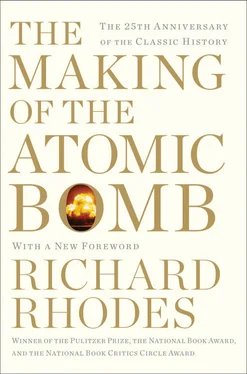Russia’s contribution to German anti-Semitism was plagiarized from a work of political satire, Dialogues from Hell Between Montesquieu and Machiavelli , written by a French lawyer, Maurice Joly, and first published in Brussels in 1864. Montesquieu speaks for liberalism, Machiavelli for despotism. The concoction of the Protocols was probably the work of the head of the czarist secret police outside Russia, a Paris-based agent named Pyotr Ivanovich Rachkovsky. Borrowing and paraphrasing Machiavelli’s speeches without even bothering to change their order and attributing them to a secret Jewish council, Rachkovsky was attempting to discredit Russian liberalism by showing it to be a Jewish plot. A St. Petersburg newspaper serialized the earliest version of the Protocols in 1903. It was one of three books belonging to the Czarina Alexandra Feodorovna—the other two were the Bible and War and Peace —found among her possessions at Ekaterinburg after the murder of the imperial family by Communist revolutionaries on July 17, 1918.
That coincidence returned the Protocols west. Fyodor Vinberg, who arranged the German translation and publication of the Protocols in Berlin in 1920, was a colonel in the Imperial Guard. The Czarina had been an honorary colonel of his regiment and he had worshiped her. He escaped to Germany at the end of the Great War convinced that her murderers had been Jews. Thereafter revenge on the Jews was the central fixation of his life. He was a friend to Hitler’s advisers, particularly the Nazi Party “philosopher,” Russian-born Alfred Rosenberg, who published a study of the Protocols in 1923.
The fiction of a Jewish world conspiracy had practical value for the Nazi Party. As it had done for earlier anti-Semitic parties, writes Hannah Arendt, who was on the scene as a student in Berlin in the 1920s, it “gave them the advantage of a domestic program, and conditions were such that one had to enter the arena of social struggle in order to win political power. They could pretend to fight the Jews exactly as the workers were fighting the bourgeoisie. Their advantage was that by attacking the Jews, who were believed to be the secret power behind governments, they could openly attack the state itself.” 668
The fiction also served for propaganda, to reassure the German people: if the Jews could dominate the world, then so could the Aryans. Arendt continues: “Thus the Protocols presented world conquest as a practical possibility, implied that the whole affair was only a question of inspired or shrewd know-how, and that nobody stood in the way of a German victory over the entire world but a patently small people, the Jews, who ruled it without possessing instruments of violence—an easy opponent, therefore, once their secret was discovered and their method emulated on a larger scale.” 669
But the scurrilities of Mein Kampf, which on the evidence of their incoherence are not calculated manipulations but violent emotional outbursts, demonstrate that Hitler pathologically feared and hated the Jews. In black megalomania he masked an intelligent, industrious and much-persecuted people with the distorted features of his own terror. And that would make all the difference.
* * *
A German journalist had the temerity in 1931 to ask Adolf Hitler where he would find the brains to run the country if he took it over. Hitler snapped that he would be the brains but went on contemptuously to enlist the help of the German class that still resisted voting the Nazis into power:
Do you think perhaps that, in the event of a successful revolution along the lines of my party, we would not inherit the brains in droves? Do you believe that the German middle class, this flower of the intelligentsia, would refuse to serve us and place their minds at our disposal? The German middle class would take its stand on the famed ground of the accomplished fact; we will do what we like with the middle class. 670
But what about the Jews, the journalist persisted—those talented people, war heroes among them, Einstein among them? “Everything they have created has been stolen from us,” Hitler charged. “Everything that they know will be used against us. They should just go and foment their unrest among other peoples. We do not need them.”
At noon on January 30, 1933, Adolf Hitler, forty-three years old, gleefully accepted appointment as Chancellor of Germany. With the Reichstag fire and the subsequent suspension of constitutional liberties, with the Enabling Act of March 23 by which the Reichstag voluntarily gave over its powers to the Hitler cabinet, the Nazis began to consolidate their control. They moved immediately to legalize anti-Semitism and abolish the civil rights of German Jews. Meeting at his country retreat in Berchtesgaden with Joseph Goebbels, now his propaganda minister, Hitler decided on a boycott of Jewish businesses as an opening sally. 671The national boycott began on Saturday, April 1. Already during the previous week Jewish judges and lawyers had been dismissed from practice in Prussia and Bavaria. Now newspapers conveniently published business addresses and teams of Nazi storm troopers stationed themselves at storefronts to direct the mobs. Jews caught in the streets were beaten while the police looked on. The boycott was a nationwide German pogrom and it lasted through a violent weekend.
A month earlier, the evening after the Reichstag fire, Wolfgang Pauli had dropped in on a Göttingen group that included Edward Teller. The group had discussed Germany’s political situation and Pauli had declared emphatically that the idea of a German dictatorship was Quatsch, Pauli’s favorite dismissal: rubbish, mush, nonsense. “I have seen dictatorship in Russia,” he told them. “In Germany it just couldn’t happen.” 672In Hamburg Otto Frisch had mustered similar optimism, as indeed had many Germans. “I didn’t take Hitler at all seriously at first,” Frisch told an interviewer later. “I had the feeling, ‘Well, chancellors come and chancellors go, and he will be no worse than the rest of them.’ Then things began to change.” 673The Third Reich promulgated its first anti-Jewish ordinance on April 7. The Law for the Restoration of the Professional Civil Service, the harbinger of some four hundred anti-Semitic laws and decrees the Nazis would issue, changed Teller’s life, Pauli’s, Frisch’s, the lives of their colleagues decisively, forever. It announced bluntly that “civil servants of non-Aryan descent must retire.” 674A decree defining “non-Aryan” followed on April 11: anyone “descended from non-Aryan, especially Jewish, parents or grandparents.” 675Universities were state institutions. Members of their faculties were therefore civil servants. The new law abruptly stripped a quarter of the physicists of Germany, including eleven who had earned or would earn Nobel Prizes, of their positions and their livelihood. 676It immediately affected some 1,600 scholars in all. 677Nor were academics dismissed by the Reich likely to find other work. To survive they would have to emigrate.
Some had already left, among them Einstein and the older Hungarians. Einstein read the signs correctly because he was Einstein and because he had borne the brunt of the attack since immediately after the war; the Hungarians had become connoisseurs by now of advancing fascism.
Theodor von Kármán departed first, from Aachen. He had pioneered aeronautical physics; the California Institute of Technology, then vigorously assembling its future reputation, wanted to include that specialty in its curriculum. Aviation philanthropist Daniel Guggenheim was prevailed upon to contribute. The Guggenheim Aeronautical Laboratory, with a tenfoot wind tunnel, began operation under von Kármán’s direction in 1930.
Читать дальше












